【新实用】新人教版高二英语必修五第一单元+Great++Scientists教案之语言点详解
新人教高中英语必修5Unit1 Great scientists(ppt)

He also began to experiment using the same drugs to help women when they had babies. That is why he became the doctor for Queen Victoria at the births of her many children.
John Snow (1813-1858) was born and worked as a doctor in Great Britain. He was originally an anesthetist, which means that he put people to sleep during operations.
Scientific Report by John Snow
The problem
The cause
Idea 1:
Idea 2 :
The method
The results
Idea 1 or 2? Why?
The conclusion
Nobody knew the caused of the serious disease of cholera.
Task 2. Ss discuss and answer the following questions. 1. What do you know about infectious diseases? What do you know about cholera? 2. Do you know how to prove a new idea in scientific research? Discuss in small groups the stages in examining a new scientific idea. What order would you put them in? Draw a conclusion Find a problem Think of a method Analyse the results Collect results Repeat if necessary Make up a question
高中英语 Unit 1 Great Scientists课件 新人教版必修5

characteristic radium painter scientific conclude conclusion analyse defeat expert attend physician expose cure challenge victim absorb suspect enquiry neighbourhood severe pump foresee blame pollute handle link 词汇 announce instruct construct construction contribute firework chart positive movement backward spin enthusiastic cautious reject universe
10
Hooke’s early education began at home,under the guidance of his father.He entered Westminster School at the age of thirteen,and from there he went to Oxford,where he came in contact with some of the best scientists in England.Hooke impressed them with his skill at designing experiments and devising instruments.In 1662,at the age of twentyeight,he was named Curator of Experiments of the newly formed Royal Society of London.Hooke accepted the job,even though he knew that it had no money to pay him!
人教版(新课程标准)必修五Unit1Greatscientists单词课件
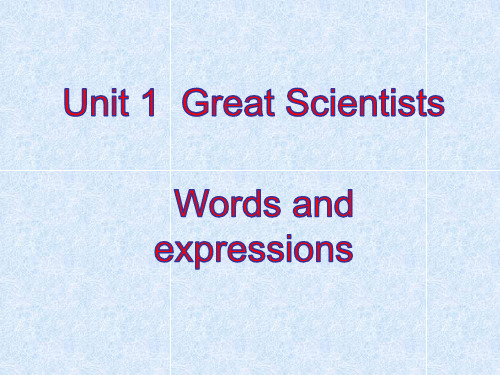
10. expose vt. 暴露,揭露, 使曝光
expose crime揭露罪行 expose the truth揭露真相 • expose sth./sb./oneself (to...) 暴露某事物/某
(2)win表示在较强的竞争中取得了胜利, 或或者在其他方面赢得了信任,荣誉等, 常带的宾语有:game, war, prize, fame, battle,belief等。win还可作为不及物动词 来用。
7. expert adj. 熟练的;经验或知识丰富的 n.(c)
专家;行家
be expert in/at/on sth善于某事;在某方面是行家 = be an expert in/at/on sth be expert in/at/on doing sth 善于某事 = be an expert in/at/on doing sth
n. (c) analysis (pl) analyses
5. infect vt. 使受影响, 影响 短语infect with 把…传染给 Often infect经常感染 Infect Others感染别人 adj. infectious 传染的;传染性的;易传染的
infected 被感染的 infective 有传染性的,感染别人的 n.(c) infection 感染;传染;影响;传染病
• outstanding adj. 杰出的;显著的; • outdoor adj. 户外的,露天的;
• 14. challenge n.[c] 挑战;怀疑 vt. 向…挑战
高中英语Unit1GreatScientists课件1新人教版必修5
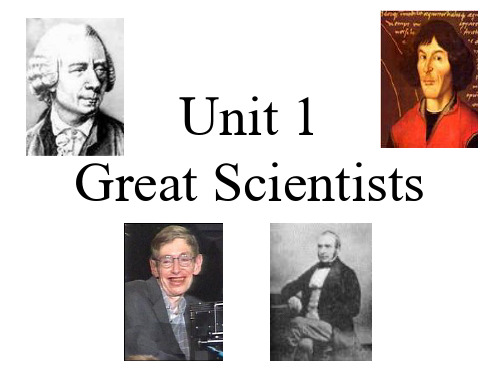
• Who discovered radium? Maries Curie
• Who invented the way of giving electricity to everybody in large cities? Thomas Edison
• Who was the painter that studied dead bodies to improve his painting of people? Leonardo da Vinci
Who are they?
Who is he?
He has made a famous kite experiment. He learned a lot from it and invented lightning rod(避雷针).
He is … Benjamin Franklin
Never leave that until tomorrow, which you can do today.
Homework:
• Write a short article about a great scientist .
பைடு நூலகம்
3.Firefighters have been called to _p_u_t__o_u_tthe fire in the city centre.
4.Don’t _p_u_t__o_f_f__ until tomorrow
what can be done today.
---Benjamin Franklin
Brainstorming
enthusiastic Co-operative
positive
bright
高中英语Unit 1 Great scientists课件1 新课标 人教 必修5
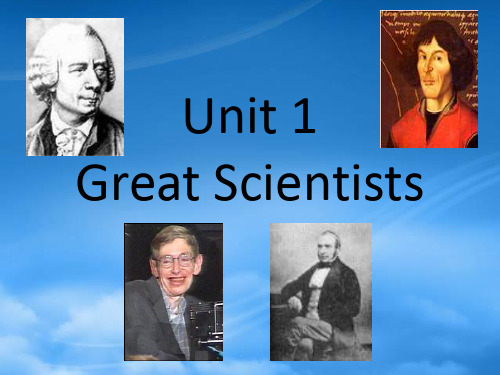
Neither its cause, not its cure was understood.
People absorbed cholera into their bodies with their meals.
Think of a method: Test two theory Collect the result: Mark the death Analyse the result: Reason for death and no death
Paragraph 4: Study of the breakout in 1854
Find a Problem: What cause the cholera?
Make a question: Which is right?
Paragraph 3-5: Study of the breakout in 1854
Paragraph 3: Study of the breakout in 1854
Mind Map of the text
John Snow Defeats “King Cholera”
Paragraph 1: Introduction of John Snow and Cholera
Paragraph 2: Two theory
The results
Idea 1 or 2? Why?
The conclusion
He found the cause of cholera was the polluted water
高中英语人教版课本同步课件:Unit1 Great scientists 必修5

爆发;发作(尤指疾病或战争) 受害者 询问 附近;邻近 泵;抽水机 (用泵)抽(水) 烟火(燃放) 图表 热情的;热心的
距离高考还有一段时间,不少有经验的老师都会提醒考生,愈是临近高考 ,能否咬紧牙关、学会自我调节,态度是否主动积极,安排是否科学合理,能 不能保持良好的心态、以饱满的情绪迎接挑战,其效果往往大不一样。以下是 本人从事10多年教学经验总结出的超实用新高考英语专题复习讲义希望可以帮 助大家提高答题的正确率,希望对你有所帮助,有志者事竟成!
背 put aside
节省;储蓄;储存;留出
相 put away
放好;积蓄
关 put off
延期;推迟
短 put up
举起;张贴;建立;提供食宿
语 put through
以……结束……
用 to conclude
最后
法 (2)come to/reach/draw a conclusion 得出结论
in conclusion
总而言之
背 ①I've come to the conclusion that he's the right person for the job.
法说明;指示 5.conclude vt.& vi.结束;推断出→conclusion n.结论;结束 6.contribute vt.& vi.捐献;贡献;捐助→ contribution n.贡献;捐款 7.reject vt.拒绝;不接受;抛弃→ rejection n.拒绝;抛弃 8.science n.科学→ scientific adj.科学的→ scientist n.科学家
高中英语 人教版新课标必修五unit 1 Great Scientists词汇 课件(共38张)
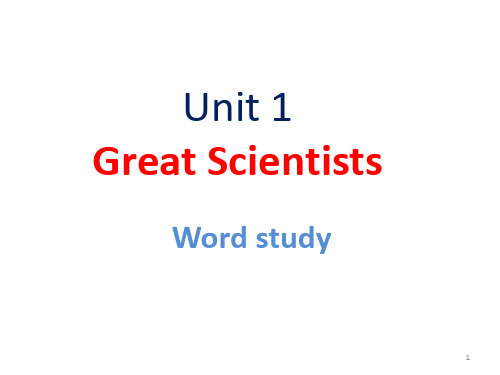
science (n)
4.构词
_s_c_ie_n_t_i_st______(n) 科学家
__sc_i_e_n_t_if_ic______(adj) 科学的
5.conclude ---reach a decision or judgement得出结论 ---(cause …to )come to an end结束
3
2 painter (n)油漆工;画家 paint (v)画画;给…油漆/U油漆;涂料 painting (U)/(C)
Ex3. My hobby is _p_a_in__ti_n_g___ and I like these _p_a_i_n_t_in_g_s____. May I know who is the _p_a_i_n_te_r___?
19
14. suspect
n. The police have arrested two suspects.
be suspicious (adj) of/ about
15. severe (adj)
causing serious harm, pain ,worry or discomfort
21
16. foresee
to see or form an idea about what is going to happen in the future in advance foresee __fo_r_e_s_a_w___ _f_o_re_s_e_e_n___
近义词
forecast forecast forecast
expose… to…
10
be exposed to … exposure (n)
Ex1. 留在屋里,不要让皮肤在阳光下暴晒。
高中英语人教版必修五5unit1GreatScientists高考复习课件

5.期末考试的成绩已公布。 The result of the final examination ___h_a_s_b_e_e_n_a_n_n_o_u_n_c_e_d___. 6.他过去的经验使他有办法处理好这件事情。 His past experience qualified him to __h_a_n_d_l_e_t_h_e_a_f_fa_i_r_. 7.她拒绝了他的邀请。 She ___r_e_j_ec_t_e_d___ his invitation. 8.他们在足球比赛中光明正大地赢了我们。 They __d_e_fe_a_t_ed__u_s_ fairly and squarely in the football match. 9.我相信充足的新鲜空气有助于健康。
讲得通;有意义 对……严格的 应受谴责 面对挑战 导致
1.put forward 提出;推举,提名;提前,把(时钟)往前拨 put oneself/sb.forward as 自荐/提名或推举某人为某职位的 候选人
put sth.forward 提出;提前,把(时钟)往前拨 put away 把……放好/收好 put off 推迟;延迟 put out 熄灭 put up 建立;建造 put down 写下来,记入名单;抑制;镇压
3.attend vt.照料;护理;出席;参加;陪伴 attend sth.出席;参加 attend to sth.注意;关心;仔细考虑 attend on sb.看护/照料/照看某人 运用 完成句子 (1)有很多人出席了会议。 The meeting was well ____a_tt_e_n_d_e_d______. (2)如果你工作不专心,你就不会成功。 If you don't ____a_tt_e_n_d_t_o____ your work, you won't succeed. (3)简多年来一直在照料她那有病的母亲。 Jane has been ___a_tt_e_n_d_in_g__o_n__ her sick mother for years.
人教版高中英语必修五第一单元重点句子Unit1Greatscientists
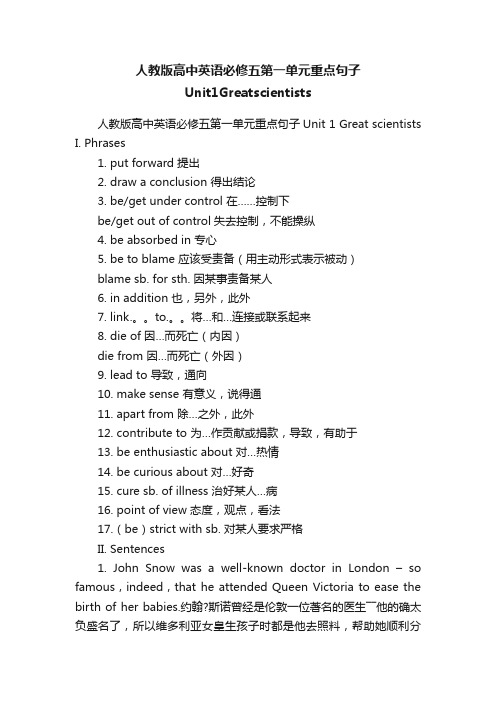
人教版高中英语必修五第一单元重点句子Unit1Greatscientists人教版高中英语必修五第一单元重点句子Unit 1 Great scientistsI. Phrases1. put forward 提出2. draw a conclusion 得出结论3. be/get under control 在……控制下be/get out of control失去控制,不能操纵4. be absorbed in 专心5. be to blame 应该受责备(用主动形式表示被动)blame sb. for sth. 因某事责备某人6. in addition 也,另外,此外7. link.。
to.。
将…和…连接或联系起来8. die of 因…而死亡(内因)die from 因…而死亡(外因)9. lead to 导致,通向10. make sense 有意义,说得通11. apart from 除…之外,此外12. contribute to 为…作贡献或捐款,导致,有助于13. be enthusiastic about 对…热情14. be curious about 对…好奇15. cure sb. of illness 治好某人…病16. point of view 态度,观点,看法17.(be)strict with sb. 对某人要求严格II. Sentences1. John Snow was a well-known doctor in London –so famous,indeed,that he attended Queen Victoria to ease the birth of her babies.约翰?斯诺曾经是伦敦一位著名的医生――他的确太负盛名了,所以维多利亚女皇生孩子时都是他去照料,帮助她顺利分娩。
2. But he became inspired when he thought about helping ordinary people exposed to cholera.但当他一想到要帮助患病的普通老百姓,特别是那些得了霍乱的患者时,他就感到很振奋。
高中英语:Unit1 (Great Scientists )教案新人教版必修5 教案
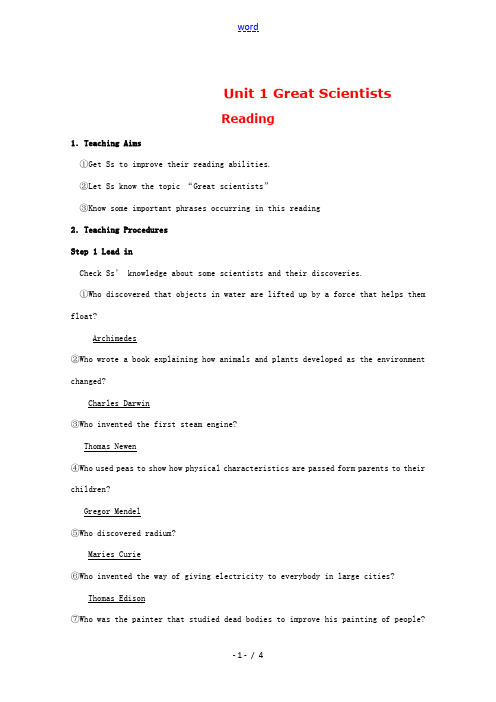
Unit 1 Great ScientistsReading1.Teaching Aims①Get Ss to improve their reading abilities.②Let Ss know the topic “Great scientists”③Know some important phrases occurring in this reading2.Teaching ProceduresStep 1 Lead inCheck Ss’ knowledge about some scientists and their discoveries.①Who discovered that objects in water are lifted up by a force that helps them float?Archimedes②Who wrote a book explaining how animals and plants developed as the environment changed?Charles Darwin③Who invented the first steam engine?Thomas Newen④Who used peas to show how physical characteristics are passed form parents to their children?Gregor Mendel⑤Who discovered radium?Maries Curie⑥Who invented the way of giving electricity to everybody in large cities?Thomas Edison⑦Who was the painter that studied dead bodies to improve his painting of people?Leonardo da Vinci⑧Who invented a lamp to keep miner safe underground?Sir Humphrey Davy⑨Who invented the earliest instrument to tell people where earthquakes happened?Zhang Heng⑩Who put forward a theory about black holes?Stephen HawkingAfter all the questions, then lead in the passage with a picture. Ask ss if they know the map and what it is used for. Give them the answer later “It is a map to find out the cause of Cholera. ”Step 2 Skim and ScanMore questions are given to get the general ideas of this passage and some obvious facts.Who defeats “King Cholera“?John SnowWhat happened in 1854?Cholera outbreak hit London.How many people died in 10 days?500Why is there no death at No. 20 and 21 Broad Street as well as at No. 8 and 9 Cambridge Street?These families had not drunk the water from the Broad Street pump.Step 3 Reading for details1 Why couldn’t the cholera be under control at first?Neither its cause, not its cure was understood.2 Which theory did John Snow believe in?People absorbed cholera into their bodies with their meals.3 John Snow finally proved the theory he believed by ________.gathering information with the help of a maplooking into the source of the water for Broad Street and Cambridge Street Separating those who suffered cholera from those who didn’tBoth A and B (right choice)4 To prevent the cholera from spreading again, what did John Snow do?Suggested that the source of all water supplies be examine. Suggested that new methods of dealing with polluted water be found. Instructed the water panies not to expose people to the polluted water anymore.Step 4 Mind map of the passageParagraph 1: Introduction of John Snow and CholeraParagraph 2: Two theoryParagraph 3-5: Study of the breakout in 1854Paragraph 3: Think of a method: Test two theoryCollect the result: Mark the deathAnalyze the result: Reason for death and no deathParagraph 4: Analyze the result: Find the resource of the waterParagraph 5: Repeat if necessary: Find more evidence.Draw a conclusion: Cholera was spread by germPolluted water carried choleraParagraph 6: Prevention of CholeraStep 5 Retell the passageProvide ss with a summary with some blanks. Let them retell the passage as well as pay attention to some important words.Read the passage again and fill in the blanks:John Snow was a well-known ____ in London in the ___ century. He wanted to find the ______ of cholera in order to ______ it. In 1854 when a cholera ____ out, he began to gather information. He _____ on a map where all the dead people had lived and hefound that many people who had drunk the dirty water from the ______ died. So he decided that the polluted water carried cholera. He suggested that the _____ of all water supply be _______ and new methods of ________ with polluted water be found. Finally, “King Cholera” was defeated.Step 6 HomeworkRead the whole passage and retell.Go to the net to get more information about UK.。
新人教版必修五 Unit 1 Great scientists-Reading[课件]
![新人教版必修五 Unit 1 Great scientists-Reading[课件]](https://img.taocdn.com/s3/m/0e5cc4064a7302768e9939b3.png)
Repel (回避) may be exposed to an
infectious diseases, so may animals,
such as bird flu. AIDS, SARS are
infectious diseases.
Infectious diseases are difficult to
or dispose of waste.
Cholera can be mild or even without symptoms, a severe case can lead to death without immediate treatment. The diarrhea and vomiting brought on by the infection quickly leaves the body without enough fluid. The following dehydration(脱水) and shock can kill a person within hours.
The spread of ch epidemic in Great Britain in 1831-32
Great Britain London
Germany
Death of first cholera case in London during the 1848-49 epidemic
leg cramps(小腿抽筋).
The most common cause of cholera is by someone eating food or drinking water that has been contaminated with the
高中英语 Unit 1 Great scientists课件 新人教版必修5

Unit 1
Great scientists
John Snow John Snow was born on March 15,1813 , in the city of York , England.As a boy he proved to be a bright student,so his mother sent him to a private school.
floated around until it found its victims.
• On April 7,1853,he used chloroform (三氯甲烷,医用麻醉剂) to Queen Victoria at the birth of her eighth child,Prince Leopold.And it wasn’t until 1854,when cholera struck England once again,that Snow’s argument that cholera was
• Snow planned to become a physician,and at fourteen,he was apprenticed (使……当学徒) to Dr.William Hardcastle in Newcastle-upon-Tyne.During his early years as an apprentice,
人教新课标 高二英语必修五 unit 1Great_Scientists-Grammar 课件

1.They are excited.(表语) 2.He looked worried after reading the
letter.(表语) 3.When we heard of this, we were
状态。
be+过去分词表状态
时,是系动表作结(被构动,语态)
而表示动作时,是
状被态动语态,而且动
作的执行者由by引 出
My glasses are broken.
My glasses were broken by my little brother.
V-ed作表语表主语的状态,被动语态表示被动的动作。
区别
归纳:
与感觉相关的及物动词,其过去分词含有被动含义,即 “人被引起某种感觉”,多用来形容人、人的声音或者表 情。而其现在分词表示主动意义,即“令人有某种感觉”
The library is closed.
区别
The library is closed by the teacher.
过去分词作表 语,通常表示 主语的所处的
The_fallen_ (fall) leaves
are beautiful.
定语
They were excited___ 表
(excite).
语
The 29th Olympic Games
__held___(hold ) in Beijing
was successful.
定语
过去分词(短语)作定语的位置
Step6 The differences between past participle and present participle as the predicative
- 1、下载文档前请自行甄别文档内容的完整性,平台不提供额外的编辑、内容补充、找答案等附加服务。
- 2、"仅部分预览"的文档,不可在线预览部分如存在完整性等问题,可反馈申请退款(可完整预览的文档不适用该条件!)。
- 3、如文档侵犯您的权益,请联系客服反馈,我们会尽快为您处理(人工客服工作时间:9:00-18:30)。
新人教版高二英语必修五第一单元Great Scientists教案之语言点详解词汇详解:一.词语辨析1). character/characteristic n.【解释】character 性格,品质(本身具有的);角色,人物;字体,字符characteristic 特点,特征(区别于其他事物)【练习】选择character 或characteristic 并用其适当的形式填空1)He proved himself true gentleman and the beauty of his _______ was seen at its best when he worked with others.2)People living in the city are different from those in the二.词性变化Ⅲ 重点词汇1. conclude vi.终结;结束; 推断;决定[典例]1)The meeting concluded at ten o'clock. 会议于十点钟结束。
2)It is hard to conclude.这很难断定。
[重点用法]conclusion n. 结束,结论make/draw/reach/come to/arrive at a conclusion下结论,得出结论;bring sth. to a conclusion使…结束;in conclusion作为结论,最后;[练习]汉译英1)我们推定蓝队无法按时抵达目的地。
________________________________________________________________________________2)我们认定他并没有告诉我们实情,也就是他在撒谎。
________________________________________________________________________________Keys:1) We concluded that the blue team could not reach the destination on time.2) We concluded that he didn’t tell us the truth. That is, he was lying.2. attend v.1)注意;留意;处理(与to连用)=do with2) 出席;到场:3)照看;照料:=take care; look after[典例]1)We'll attend to the problem later.稍后我们将关注那个问题。
2)Which doctor is attending you?哪一个医生为你看病?[重点用法]attendance n.出席,出席的人数,伺候,照料attend school上学attend a lecture/meeting听讲座/出席会议attend a wedding/ceremony出席婚礼‘/参加典礼[练习]汉译英1)他们在我们不在时管理事务。
________________________________________________________________________________2) 他在这个领域很出名,今晚会有成千上万的敬仰者参加他的讲座。
________________________________________________________________________________Keys: 1) They attended our affairs during our absence.2) He is famous in this field, and tens of thousands of fanswill attend his lecture this evening.3. expose vt.1)使暴露, 显露 2)曝光 3)揭露[重点用法]exposure n.(在日光、风雨、危险中)暴露,暴晒(后接to + n.);(摄影的)曝光be exposed to ….置身于……;暴露于…[典例]1)A real artist can always expose his students to good art and music称职的艺术家总能使学生接触美好的艺术和音乐2)This film has been exposed.这片子已经感光。
3)He exposed the plan to the newspapers.他向几家报纸透露了这个计划。
4)Exposure to the cold wind left my lips feeling dry.我暴露在寒风中,觉得嘴唇干裂。
5)As a journalist in the war, she was exposed to many dangers. 作为战地记者,她置身于多种危险中.[练习]用expose的恰当形式填空。
1)The soil was washed away by the flood,_____________bare rock.2)The baby was left ____________the wind and rain.3)The _____________of the plot against the President probably saved his life.Keys: 1) exposing 2) exposed to 3) exposure4. absorb1) 吸收 2)使(精神)贯注 3)占用(时间)[重点用法]be absorbed in 全神贯注于;热衷于;absorb one’s attention吸引某人注意力[典例]1)The equipment can absorb moisture from the air这一设备能从空中吸收水分2)He is absorbed in study.他专心读书。
3)This job absorbs all of my time.这件工作占用了我的全部时间。
[练习]汉译英1)颜色丰富的东西总能轻易地吸引孩子们的注意力。
________________________________________________________________________________这双新鞋特别设计了吸收能量的作用。
________________________________________________________________________________Keys: 1) Things in colour can often absorb children’s attention easily.2) The new shoes are specially designed to absorb the energy.5. blame vt.责备;谴责;归咎于;n.责怪;(过失、过错等)责任[典例]1)The careless driver is to blame for the traffic accidenthappening yesterday.那个粗心的司机该为昨天发生的交通事故负责。
2) Who is to blame for the failure?谁该为这次的失败负责?3) The student blamed the teacher for his failure.学生因失败而怪老师。
[重点用法]blame sb.for(doing)sth.因(做)某事而指责某人blame sth.on sb.因某事而指责某人sb.be to blame for(doing)sth.因(做)某事某人应该受到谴责;注意: be to blame 应负责 (无被动形式)。
[练习]汉译英1)看来霍乱的流行要归罪于饮用水了.___________________________________________________________ _____________________2)这件事谁也不能怨.___________________________________________________________ _____________________3)他指责你玩忽职守.___________________________________________________________ _____________________Keys: 1) It seemed that the water was to blame.2) Nobody is to blame for it.3) He blames you for neglect of duty.6. instruct vt教导; 指示[典例]1)Miss Liu instructed a class in math last year.刘老师去年给一个班学生上数学课.2)The volunteers often go to an orphan home to instruct orphans. in English这些志愿者经常去孤儿之家去教他们英语.3)He was instructed when to start through the email.他从邮件中得到出发时间的通知4)He was instructed to sail for New York.他奉命前往纽约。
[重点用法]instruct sb.( in sth.) 教, 教导,传授技能instruct sb. to do; instruct wh-命令, 指示,instruct that-clause通知[练习]汉译英1)老职工对青年职工言传身教.___________________________________________________________ _____________________2)同时要求孩子们放学后留在教室里.___________________________________________________________ _____________________Keys: 1) The old workers instruct the young workers not only in words, but by deeds.2)The children were also instructed not to leave the classroom after class.7. contribute vi.&vt.捐助,捐献,贡献;投稿[典例]1)He contributed to the church.他向教会捐款。
